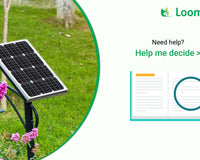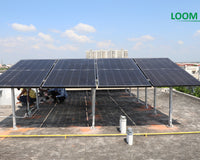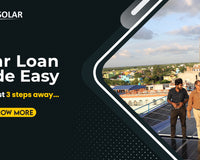India has become a hot-selling solar market despite people still facing several major issues. People are interested in installing solar systems but are unaware of its full potential and usually get scared away by minor operational issues or huge investment decisions. The major criticisms/ problems that people in India have against solar are:
i) People think it is better to open a bank account and have your money deposited there, rather than investing in solar.
ii) People do not have the required space to install a solar system. Majority of people in India stay on rent, especially in large cities.
iii) Some people say that their electricity bill is low and hence it does not make financial sense to invest in a solar system as the payback period will be longer.
iv) People want such a solar system that will not only reduce their electricity bills but will also recharge the batteries or run appliances at the time of power cuts.
Despite these problems, India has witnessed an impressive rate of solar installations. In this blog we will discuss the thoughts that cross peoples’ minds before and after installing solar systems. It will help you in making a firm decision whether solar is beneficial for you or not.
Here is a table that is prepared after analyzing both residential and commercial sectors. It is important for people in solar business and also owners to be aware of this data.

Residential Solar System

A solar system (with battery system) of up to 10kW in capacity that is installed at homes qualifies to be a residential solar system. The investment would be somewhere around Rs. 1,00,000 per kW. The electricity bills of a home is generally Rs. 1,000 per month. Installing a solar system in such an establishment could result in savings of Rs.8,400 per annum. The investment is expected to have an RoI (payback period) of ~10-11 years and return on investments will be around 8%.
Major Challenges for Homeowners

Homeowners have three major reasons that they are not installing solar systems on their homes. Let's see...
1. Budget Constraints

Funds for investing in a solar system is usually the biggest headache for a homeowner. Arranging around Rs. 1,00,000 per kW for installation is not a small task for a common man. He would prefer to install other necessary facilities/ equipment rather than installing an alternative source of energy. But they need to be fully aware of its benefits.
2. Double Expectation

As mentioned above, people have double expectations from a solar system, i.e. they want such a solar system that will not only reduce their electricity bills but also expect all their electrical appliances to work during load-shedding.
3. Net Meter

The net metering has always remained a big issue. The net metering option allows an owner to claim credit for the energy he sends back to the grid. Though it sounds very simple and exciting, that is not always the case. People face issues in procuring the net meters and those who have say that it is only good in papers, but reality is totally different.
Commercial Solar System

A solar system (grid-connected) of up to 25kW in capacity that is installed at hospital, factory, offices, resort, school, colleges, showrooms, cold storage, petrol pump, hotels, workshops etc. qualifies to be a commercial solar system. The investment would be somewhere around Rs. 50,000 per kW. The electricity bill ranges around Rs. 25,000 per month. Installing a solar system in such an establishment could result in savings of Rs.14,000 per annum. The investment is expected to have an RoI of ~3-4 years with return on investment of around 28%.
Major Challenges for Business Owners

Similar to homeowners, there are also some challenges with business owners too. We understand three basic problems with them:
1. Installation Space

The commercial establishments have a limitation of area that is needed for installation of solar. Many of these establishments are also on rent, where the owner is not free to make such installations. Also space crunch is a major issue in cities.
2. Return on Investment

Business owners expect a payback period of average 4 years but they just focus on the solar panels. They will buy solar panels of good brands but will not focus on other components like inverters, BoS, etc. So if any other component malfunctions, the performance of the whole system will come down thus negatively impacting the Return on investment.
3. Durability

Business owners focus only on one component say solar panel and ignore other important component of the system ie. mounting structure. Imagine if the base is not strong how will the system work. You have spent a huge amount of money only on panels but tried and saved a few bucks on mounting structure. If this structure fails to support the solar panels all your money will be wasted.
Feasible Solution for Home Owner

#1. Buy Solar System on EMI

A homeowner can opt for taking a loan (for home improvement) for solar on EMI to reduce his financial burden. Few banks in India offer such loans.
#2. Install Hybrid Solar System

A few companies have started making a hybrid solar system which might help customers to solve their double expectations. But it is still not guaranteed.
#3. Discover Self Solution

Getting net metering option is not feasible through third-parties. A customer should himself find out about net metering options at his own electricity bill office. There are online portals for some states like UP, Haryana, Bihar, etc. which might also be of help to customers. Net metering is available for most states but is different for all states and rules also keep changing.
Feasible Solution for Business Owner

#1. Customized Installation

A commercial/ business owner can opt for wall mounted solar panels to solve their issue of space constraint. Or, he can discuss with the engineers for any other viable customized options for best performance.
#2. Analyze Everything

As we have already discussed above, that business owners should put their focus on the entire solar system rather than just a simple component because any issue in just one part can take the whole system down. If they focus on all parts they will have no complaints about their returns.
#3. Install High Quality Products

They should install high quality products or products of reputed companies for their entire solar system, be it panels, or inverters or mounting structure, etc. Any lapse in one product can adversely affect the working and returns from the solar system.
How to Install the Solar System?

To save your mind from unnecessary worries and problems, follow this five-points checklist before installing a solar system at your home or workplace.
#1. Subject Expert Matter Guidance

Though much of the information is available on the internet, it is better to seek advice from a SME. He will guide you properly regarding your specific issues regarding your location, area, budget, type of system, brands, etc. You will save yourself a lot of headache if you have the reassurance of a subject matter expert.
#2. Right Product Selection

Always go for the best brands and the right products for your system because solar entails a massive investment. Don’t let your hard-earned money go down the drain by not choosing the right products.
#3. Scope of Work

Be clear and discuss with the system providers and installers about their scope of work to avoid any last minute arguments.
#4. System Performance

Buy the products only once you are satisfied that the product is right for you and its performance is good. Also keep an eye on the performance of the system even after installation. Nowadays, many apps are available to monitor the performance and you can connect with your system provider in case of a lapse or issue.
#5. Installer Portfolio

Please be fully satisfied that you have chosen the best installer in your area to do the job. Check the installer’s history and details of any franchise to which he is associated, if any. You can also go look for other installations that he has done in your town/ city. If there is any lapse in the installation process, your whole system might just crumble.
Conclusion
We should be always cautious before making any type of investment. We always think and weigh the pros and cons even before buying a small thing so some extra caution before big investment decisions won’t hurt. Remember, to check the risks, returns associated with the investment, time and your personal conditions before making this investment. Solar technology has become increasingly popular given its efficiency and rapidly falling cost. A handful of people in India have installed solar for the purpose of an investment. But in the near future when electricity meters become prepaid, solar will also be installed for investment purposes commonly.
हिंदी में पढ़े: सोलर एनर्जी सिस्टम में निवेश करना कितना लाभदायक?












